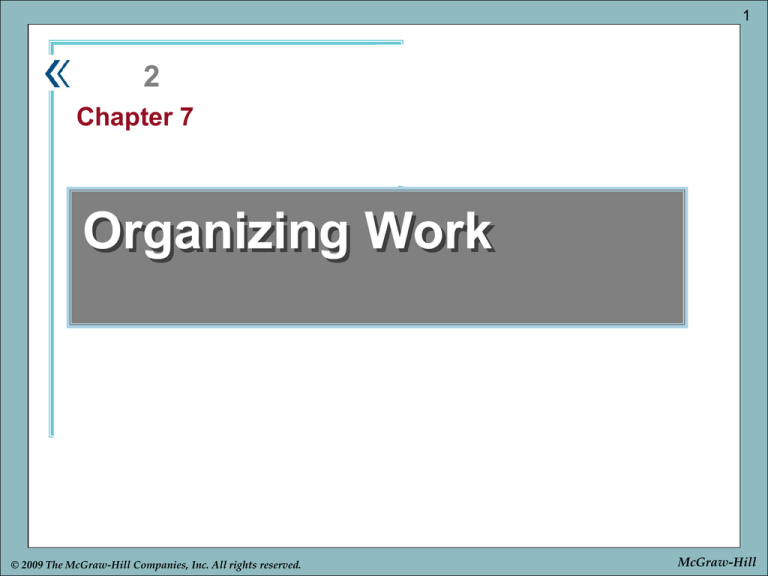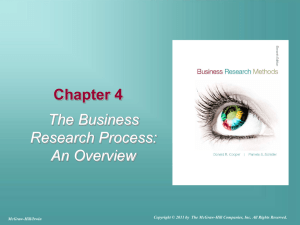
1
part 2
Chapter 7
Chapter
Organizing Work
© 2009 The McGraw-Hill Companies, Inc. All rights reserved.
McGraw-Hill
2
Learning Objectives
1. Explain the importance and rationale behind
organizing work.
2. Define division of labor.
3. Distinguish between power, authority, and
responsibility.
4. Explain the concept of centralization versus
decentralization.
5. Define empowerment.
6. Identify several reasons why managers are
reluctant to delegate authority.
McGraw-Hill
© 2009 The McGraw-Hill Companies, Inc. All rights reserved.
3
Organizing Work
•
•
•
•
Most work done through organizations
Process of organizing – division of labor
More effective use of resources
Informal organization
Reasons for Organizing
• Primary reason – establish lines of authority
• Improves efficiency and quality
– Synergism
• Final reason – improve communication
McGraw-Hill
© 2009 The McGraw-Hill Companies, Inc. All rights reserved.
4
Division of Labor
• Organizing
• Labor can be divided
– Vertical division
– Horizontal division
• 6 advantages of horizontal division
•
•
•
•
McGraw-Hill
Major problem – boredom and humiliation
Job scope
Job depth
Not desirable in all situations
© 2009 The McGraw-Hill Companies, Inc. All rights reserved.
5
Power, Authority, and Responsibility
• Power
• Authority
• Responsibility
Sources of Authority
• Function of position
• Formal theory
• Acceptance theory
McGraw-Hill
© 2009 The McGraw-Hill Companies, Inc. All rights reserved.
6
Centralization versus
Decentralization
•
•
•
•
•
•
•
Limitations to the authority
Funnels – Figures 7.1 and 7.2
Degree of authority
Never completely either
Today’s trend – more decentralization
Advantage – flexibility and quicker action
Disadvantage – potential loss of control
McGraw-Hill
© 2009 The McGraw-Hill Companies, Inc. All rights reserved.
7
Empowerment
• A form of decentralization
• Managers express confidence
• Four elements must be present:
– Participation, innovation, access to
information, and accountability
•
•
•
•
McGraw-Hill
Looks simple
Several actions to implement
Today’s trend
Self-managed work teams
© 2009 The McGraw-Hill Companies, Inc. All rights reserved.
8
Principles Based on Authority
• Key concepts – delegation, unity of command,
the scalar principle, and the chain of command
Delegation: The Parity Principle
•
•
•
•
•
•
•
McGraw-Hill
Herbert Engel
Occurs when one needs something done
Responsibility
Parity principle
Subordinates must accept
Reasons for manager’s reluctance
Successful delegation
© 2009 The McGraw-Hill Companies, Inc. All rights reserved.
9
How to Delegate
•
•
•
•
•
•
•
•
•
McGraw-Hill
Successful delegation
Defining objectives
Controlling delegation
Checks
Most vague part
Rule of thumb
Failure to master
Exception principle
Micromanaging
© 2009 The McGraw-Hill Companies, Inc. All rights reserved.
10
Unity of Command
• One immediate manager
• Key to avoiding problems
• Problems stem from managers
Scalar Principle
• Chain of command
• Problem
• Common misconception
McGraw-Hill
© 2009 The McGraw-Hill Companies, Inc. All rights reserved.
11
Span of Management
•
•
•
•
•
•
•
McGraw-Hill
Sir Ian Hamilton
V. A. Graicunas
Lyndall Urwick
Criticism
Revision
Opposite situation overlooked
Pros and cons
© 2009 The McGraw-Hill Companies, Inc. All rights reserved.
12
Workplace Changes in
Organizations
• Changes
• Flextime
– advantages
• Telecommuting
– Advantages
– Disadvantages
• Job sharing
– Forms
– Critical factor
– Benefits
McGraw-Hill
© 2009 The McGraw-Hill Companies, Inc. All rights reserved.










